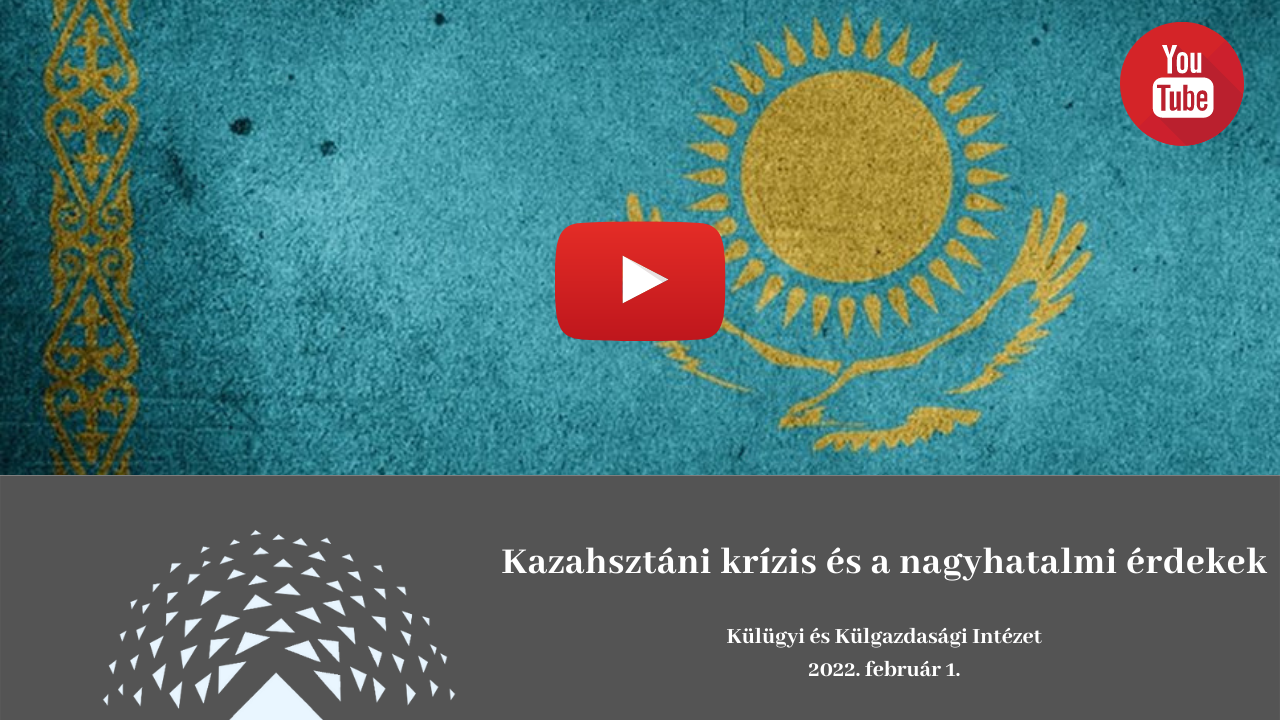On February 1, 2022 the Institute for Foreign Affairs and Trade (IFAT) held an online roundtable discussion titled “The Crisis in Kazakhstan and Great Power Interests”. The conference focused on the protest in January 2022 that erupted in response to the significant fuel prices rises resulting from governmental decisions. The participants were György Ilyash, Russia expert, Viktor Eszterhai, China expert and Zoltán Egeresi, Turkey expert. The discussion was moderated by László Vasa.
The event unfolded with László Vasa’s introduction of the topic, within which the Senior Research Fellow of our Institute briefly outlined the circumstances of the protests and highlighted the fact that various foreign state and non-state actors played a significant role in the escalation of the protests. He also stressed, however, that Russian intervention was essential to restore order.
In his reply, György Ilyash described the close nature of Kazakh-Russian interstate relations and also drew attention to the extremely high confidence of the Kazakh population in Russia. The expert argued that this particularly close relationship could have greatly contributed to the rapid success of the CSTO peacekeeping mission.
Presenting the Chinese perspective on the region, Viktor Eszterhai highlighted that Kazakhstan is a key trading and energy-import partner for China and a key player in the implementation of the One Zone One Way initiative. Our expert drew attention to the questionability of how long the current status quo in the region can be maintained, as currently the Russian military ensures the stability of the region, while China slowly overtakes the economic role of the former Soviet Union.
Zoltán Egeresi analyzed the region from a Turkish perspective, highlighting that Central-Asia is important to Turkey primarily from an identity political and ethnic perspective, due to its goal of becoming the leading state of the “Turkish world”. He also argued, however, that while in the 1990s this goal seemed obtainable, by now it has become clear that great interests and geographical distance hinders the building of stronger ties. Egeresi reinforced the notion by arguing that despite Ankara’s close political ties with the region, the degree of trade and economic integration remained low. All experts agreed that there was a strong “indecisiveness” on the part of Turkey in responding to the crisis and that there was no clear evidence that it had intervened in the events in Kazakhstan, as it had no interest in destabilizing the region.
Commenting on China’s response to the crisis, Viktor Eszterhai stressed that China reacted very slowly to the events and pursued very inaccurate diplomacy during the crisis, further strengthening Kazakh distrust of China and the confidence in Russia. In his reaction, György Ilyash outlined that for Russia, stability is the primary interest in the region, thus the status quo, which currently allows Kazakhstan to pursue a consistent and balanced foreign policy towards the great powers, is unlikely to change. Therefore, the country’s foreign policy is unlikely to change after the CSTO mission and Kazahstan is likely to pursue bilateral relations on the same principles as it did since independence.
The roundtable ended with a discussion of the United States’ impact on the January events. Experts agreed that the U.S. had no strategic interest in triggering the events, and it was even an interesting episode that during the intervention CSTO troops protected U.S. oil and gas investments as critical infrastructure. However, they also unanimously stated that there may have been an American tactical interest in disrupting the Russian hinterland.
For the full recording please click on the link below or visit our YouTube-channel!
JTNDaWZyYW1lJTIwd2lkdGglM0QlMjIxMDAlMjUlMjIlMjBoZWlnaHQlM0QlMjI0NTAlMjIlMjBzcmMlM0QlMjJodHRwcyUzQSUyRiUyRnd3dy55b3V0dWJlLmNvbSUyRmVtYmVkJTJGZ3RnUTdiUHZUWWMlMjIlMjB0aXRsZSUzRCUyMllvdVR1YmUlMjB2aWRlbyUyMHBsYXllciUyMiUyMGZyYW1lYm9yZGVyJTNEJTIyMCUyMiUyMGFsbG93JTNEJTIyYWNjZWxlcm9tZXRlciUzQiUyMGF1dG9wbGF5JTNCJTIwY2xpcGJvYXJkLXdyaXRlJTNCJTIwZW5jcnlwdGVkLW1lZGlhJTNCJTIwZ3lyb3Njb3BlJTNCJTIwcGljdHVyZS1pbi1waWN0dXJlJTIyJTIwYWxsb3dmdWxsc2NyZWVuJTNFJTNDJTJGaWZyYW1lJTNF

